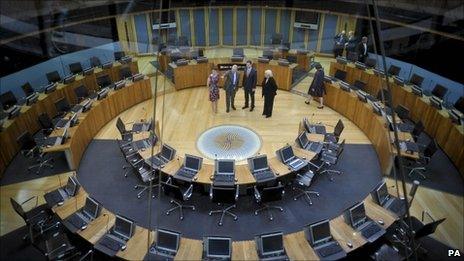Spending Review: Cuts may shape assembly election
- Published

The Conservatives and Lib Dems could lose the 'blame game' with voters, says one academic
Governments always introduce unpopular measures early in their terms. The closer politicians are to an election the less willing they are to alienate voters who will soon be passing their verdicts of their record.
It is no surprise that the Conservative-Liberal Democrat coalition has decided to announce painful spending cuts early in the parliamentary term. The timing places their counterparts in the Welsh assembly in a difficult position.
In little more than six months' time, assembly members will face the electorate, and Welsh Conservatives and Liberal Democrats fear that voters may use the election as a referendum on the record of David Cameron's government.
Professor Roger Scully, of the Institute of Welsh Politics in Aberystwyth, says that polling shows the parties are right to be worried.
"If we look at the polls that have been done in Wales since the General Election, we see one of two things - first of all we see the enthusiasm and momentum that developed behind the Liberal Democrats in the election has largely disappeared already," said Prof Scully.
"We also see the Labour party, which had been really quite unpopular in government, already starting to recover its position significantly in Wales.
"What we don't know is whether Labour will continue improving and be able to hold that improvement right through to the assembly election.
"But at the moment the trend seems to be away from the coalition parties, in particular I feel the Liberal Democrats, and towards the Cardiff coalition parties and particularly Labour."
The main hope of the two parties in the UK coalition is that voters will blame the cuts either on the assembly government, which runs most public services in Wales, or the economic record of Gordon Brown's government.
There is little prospect of that happening according to academic research.
Dr Richard Wyn Jones, of the Centre for Welsh Governance in Cardiff, said with Welsh voters it is almost inevitably Westminster that loses the blame game.
"The bad news for the Conservatives and Liberal Democrats is that we've already got evidence that the electorate in Wales - even before these cuts - tend to systematically credit the assembly level for what they think is going well and blame the UK level for what they think is going badly - irrespective of which level has power in a particular area.
"That means that the prospects for the UK government being blamed are very strong indeed. And of course one must remember the assembly government is responsible for not even the majority of government spending in Wales.
"So all those other things will naturally be seen as the responsibility of the UK government - again that makes the prospects for the Conservatives and the Liberal Democrats in particular pretty poor."
Although current polling suggests that Labour has bounced back from its historically bad performance in recent elections in Wales, it's far from certain that the party can achieve an overall majority in the assembly next year.
Dr Wyn Jones points out while the assembly's voting system favours Labour, it is still difficult for the party to win sufficient seats to govern on its own.
"Getting up to a working majority is quite difficult to envisage," said Dr Wyn Jones.
"There's also the question of what is a viable working majority in a 60-seat assembly. There's an assumption that 30 seats is a majority; it really isn't. One of the 60 has to be the Presiding Officer, people get ill etc.
"There are people in the Labour party who think that 31 is a working majority. One wise political head in the cabinet told me he thinks it's 33. I don't think there's any real prospect of Labour getting up to 33 in the Assembly election.
"The danger for Labour is that there'll be a lot of internal pressure - if they get anywhere near 30 to go it alone, either as a minority government or as a so-called majority government but without really a working majority."
While Labour might not win enough seats to govern on its own, the party does seem set to win a sufficient number to make a so called "rainbow government" comprising Plaid Cymru, the Conservatives and the Liberal Democrats unviable.
Labour sources have given strong indications that the party wouldn't attempt to run a minority administration as it did on two previous occasions. Effectively the party would have to choose between striking a new deal with Plaid Cymru to continue the current government or turning to the Liberal Democrats, a step which many in Labour see as fraught with problems.
It seems the Spending Review may influence not only the result of next year's Welsh General Election but also the government that emerges after it.